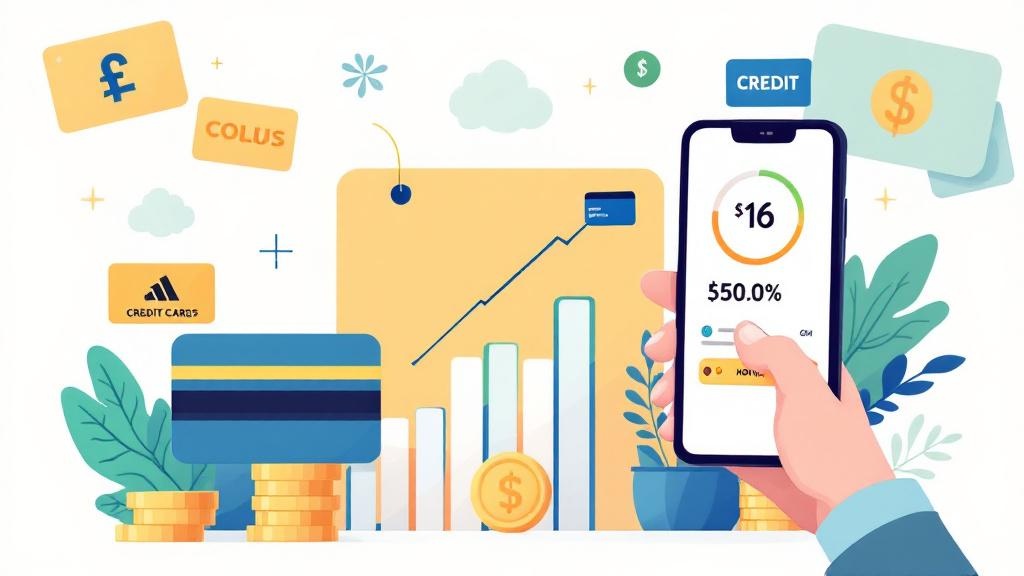A good credit score can open the door to better financial opportunities—lower interest rates, higher credit limits, and easier approval for loans and mortgages. But what if we told you that one of the best ways to improve your credit score is already sitting in your wallet? That’s right—credit cards, when used wisely, can be an excellent tool to boost your credit score. In this comprehensive guide, we’ll walk you through how to improve your credit score with credit cards, including key strategies, tips, and common mistakes to avoid.
Understanding Your Credit Score
Before diving into how to improve your credit score using credit cards, it’s important to understand how your credit score works. Your credit score is calculated based on several factors, with the following breakdown:
-
Payment History (35%): This is the record of your payments on credit accounts. Making on-time payments will have the biggest positive impact on your score.
-
Credit Utilization (30%): This refers to the percentage of your available credit that you’re currently using.
-
Length of Credit History (15%): The longer your credit history, the more favorable it is to your score.
-
Credit Mix (10%): A mix of different types of credit accounts (credit cards, loans, etc.) can benefit your score.
-
New Credit (10%): Opening new credit accounts can affect your score, especially in the short term.
How Credit Cards Impact Your Credit Score
Credit cards can have a significant impact on your credit score, especially in terms of credit utilization ratio, payment history, and credit history length. Let’s break these down:
-
Credit Utilization Ratio: This refers to how much of your available credit you’re using at any given time. Ideally, you should aim to keep your credit utilization below 30%. For example, if you have a credit limit of $5,000, try not to carry a balance higher than $1,500.
-
Payment History: Payment history makes up 35% of your credit score. If you make timely payments on your credit card, it will positively impact your score. On the flip side, missed payments can severely damage your credit score.
-
Credit History Length: If you’ve had a credit card for a while, it helps build your credit history. Lenders prefer seeing a long history of responsible credit use.
-
Credit Mix: Having a variety of credit accounts—credit cards, loans, and mortgages—can help your score, but it’s not the most important factor.
Best Credit Cards for Building Credit
Not all credit cards are created equal, especially when you’re looking to improve your credit score. If you’re just starting out or rebuilding your credit, you’ll want to consider cards designed to help build credit. Here are some options:
1. Secured Credit Cards
Secured credit cards require a cash deposit that serves as your credit limit. These are ideal for those with no credit or poor credit. They work just like regular credit cards, and with timely payments, they can help improve your credit score.
2. Student Credit Cards
If you’re a student, many banks offer credit cards designed specifically for building credit. These cards typically have lower credit limits and may offer rewards for responsible use.
3. Credit Cards for Fair or Limited Credit
If you have a fair credit score, you might qualify for a card that offers rewards and perks while helping to improve your credit score. These cards often come with a lower interest rate and fewer fees than cards for those with bad credit.
4. Store Credit Cards
Although they come with high-interest rates, store credit cards are another option for those looking to improve their credit score. They often approve people with lower credit scores, and responsible use can help you build a positive credit history.
Credit Card Payment Strategies to Improve Your Credit Score
Now that you’ve got the right credit card, it’s time to focus on payment strategies that will help improve your credit score.
1. Make Payments on Time
Your payment history is the most significant factor in determining your credit score. Even a single missed payment can cause significant damage to your score. To avoid late payments, consider setting up automatic payments for at least the minimum due each month. This ensures you never miss a payment.
2. Pay More Than the Minimum
While it’s important to make at least the minimum payment, paying more than the minimum is ideal. This will reduce your overall debt more quickly, lower your credit utilization, and show lenders that you can manage credit responsibly.
3. Pay Your Bill Before the Statement Date
One smart strategy is to pay down your credit card balance before your statement date. This can help keep your reported credit utilization low, even if you carry a balance during the month.
4. Consider a Balance Transfer
If you’re struggling with high-interest credit card debt, a balance transfer card with 0% interest can give you a break while you pay off the balance. Just be sure to pay it off before the introductory offer expires.
Managing Your Credit Utilization Ratio
Your credit utilization ratio is a key factor in improving your credit score. Keeping this ratio low—under 30%—shows lenders that you’re not overly reliant on credit and that you can manage your finances well. Here are some strategies for managing your credit utilization:
1. Increase Your Credit Limit
If you can, consider asking your credit card issuer for a higher credit limit. This will automatically lower your credit utilization ratio, even if you don’t change your spending habits. Just make sure to resist the temptation to spend more!
2. Pay Off Balances Early
Try to pay off your credit card balances in full each month. If that’s not possible, aim to reduce your balances before the statement date. Keeping your balance low compared to your credit limit can help improve your score.
3. Use Multiple Cards
If you have more than one credit card, consider spreading your purchases across multiple cards instead of loading one card with too much debt. This will help maintain a healthy credit utilization ratio on each card.
How Long Does It Take to Improve Your Credit Score with Credit Cards?
The time it takes to improve your credit score using credit cards depends on a variety of factors, including your current credit score, how much debt you have, and how quickly you make improvements. Generally, you can see a noticeable improvement in your credit score within 3-6 months if you:
-
Make on-time payments
-
Reduce your credit utilization
-
Avoid opening too many new accounts
Credit Score Tips to Maximize Results
To maximize your efforts and improve your credit score as quickly as possible, follow these credit score tips:
-
Check Your Credit Report Regularly: Regularly review your credit report to ensure there are no errors. Dispute any inaccuracies you find.
-
Don’t Apply for Too Many Cards: Applying for multiple cards in a short period can hurt your score due to hard inquiries.
-
Avoid Closing Old Accounts: Closing old credit card accounts can shorten your credit history, which can hurt your score.
FAQs About Improving Your Credit Score with Credit Cards
1. How Often Should I Use My Credit Card to Build Credit?
Using your credit card regularly—while maintaining a low balance—is important for building credit. Ideally, use it for small purchases that you can pay off each month.
2. Can Paying Credit Cards on Time Improve Credit Score?
Yes! Making timely payments on your credit cards is one of the best ways to improve your credit score.
3. What Credit Card Habits Improve Credit Score?
Paying your balance in full, keeping your utilization low, and making on-time payments are key habits for improving your credit score.
4. What’s the Best Way to Use Credit Cards to Raise Credit Score?
To raise your score, keep your utilization below 30%, make timely payments, and avoid accumulating too much debt.
5. How Long Does It Take to Improve Credit Score with Credit Cards?
With responsible credit card use, you may see an improvement in your credit score within 3-6 months.








Comments (0)